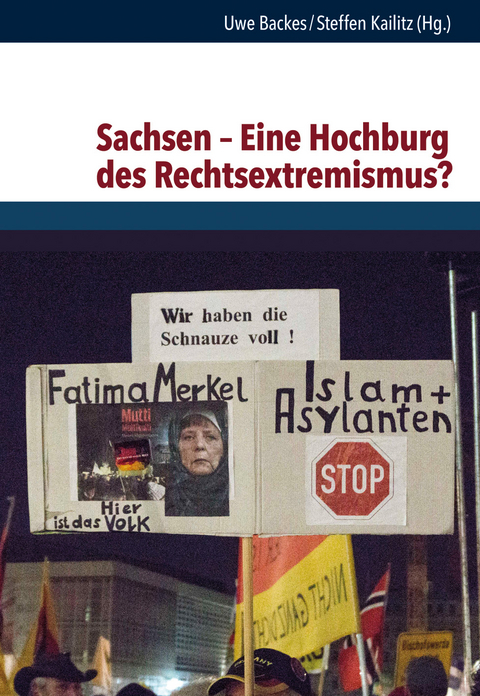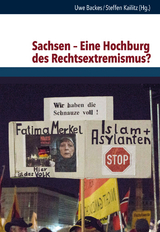Sachsen – Eine Hochburg des Rechtsextremismus?
Seiten
2020
Vandenhoeck & Ruprecht (Verlag)
978-3-525-36328-7 (ISBN)
Vandenhoeck & Ruprecht (Verlag)
978-3-525-36328-7 (ISBN)
"Hochburg Sachsen" – Umstrittene These oder Realität?
In many cases, the Free State of Saxony is seen as a stronghold of right-wing extremism and right-wing populism with prominent results of far-right parties, distinct xenophobic violent scenes and brisk right street protest. By drawing interregional comparisons with western as well as eastern countries, the authors of this volume test the "stronghold Saxony"-thesis on all levels (attitudes, voting behaviour, protest cultures, militant scenes, discourses, ideologies). Thereby, they are looking for potential causes of possible saxon particularities. This volume creates thus a multifaceted picture of right-wing extremism and right-wing populism in Saxony.
In many cases, the Free State of Saxony is seen as a stronghold of right-wing extremism and right-wing populism with prominent results of far-right parties, distinct xenophobic violent scenes and brisk right street protest. By drawing interregional comparisons with western as well as eastern countries, the authors of this volume test the "stronghold Saxony"-thesis on all levels (attitudes, voting behaviour, protest cultures, militant scenes, discourses, ideologies). Thereby, they are looking for potential causes of possible saxon particularities. This volume creates thus a multifaceted picture of right-wing extremism and right-wing populism in Saxony.
Dr. André Postert ist wissenschaftlicher Mitarbeiter am Hannah-Arendt-Institut für Totalitarismusforschung in Dresden.
Dr. Steven Schäller ist wissenschaftlicher Mitarbeiter am Lehrstuhl für Politische Theorie und Ideengeschichte an der Technischen Universität Dresden.
Dr. Sebastian Gräfe arbeitet im Sächsischen Staatsministerium des Innern in Dresden.
Anna-Maria Haase ist Politikwissenschaftlerin, B.A.
Prof. Dr. Uwe Backes ist Stellvertretender Direktor des Hannah-Arendt-Instituts für Totalitarismusforschung und lehrt an der TU Dresden an der TU Dresden.
PD Dr. habil. Steffen Kailitz forscht am Hannah- Arendt-Institut für Totalitarismusforschung an der TU Dresden.
| Erscheinungsdatum | 18.02.2020 |
|---|---|
| Reihe/Serie | Schriften des Hannah-Arendt-Instituts für Totalitarismusforschung ; Band 066 |
| Co-Autor | Bernd Wagner, André Postert, Alexander Yendell, Gert Pickel, Piotr Kocyba, Lukas del Giudice, Nick Ebner, Lea Knopf, Max Weber, Maik Herold, Steven Schäller, Lazaros Miliopoulos, Julia Schuler, Oliver Decker, Tom Mannewitz, Sebastian Gräfe, Maximilian Kreter, Grit Hanneforth, Michael Nattke, Tom Thieme, Anna-Maria Haase |
| Zusatzinfo | mit 36 Tab. u. 50 Abb. |
| Verlagsort | Göttingen |
| Sprache | deutsch |
| Maße | 170 x 245 mm |
| Gewicht | 866 g |
| Themenwelt | Geschichte ► Allgemeine Geschichte ► Zeitgeschichte |
| Geisteswissenschaften ► Geschichte ► Regional- / Ländergeschichte | |
| Schlagworte | Deutschland (DDR) /Gesellschaft, Sozialwissenschaf • Rechtsextremismus • Sachsen/Neuere Geschichte |
| ISBN-10 | 3-525-36328-1 / 3525363281 |
| ISBN-13 | 978-3-525-36328-7 / 9783525363287 |
| Zustand | Neuware |
| Informationen gemäß Produktsicherheitsverordnung (GPSR) | |
| Haben Sie eine Frage zum Produkt? |
Mehr entdecken
aus dem Bereich
aus dem Bereich
Gewalt, Umwelt, Identität, Methode
Buch | Softcover (2024)
Spector Books OHG (Verlag)
36,00 €
wie Freud im Kollektiv verschwand
Buch | Hardcover (2024)
Klett-Cotta (Verlag)
25,00 €




